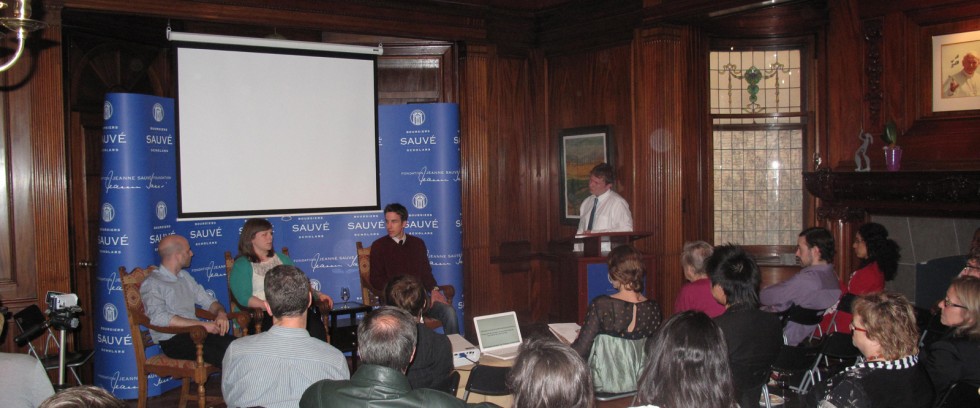
On Friday 10 May 2013, the Jeanne Sauvé Foundation hosted ‘Journalism On(the)line’, a lively conference coordinated and chaired by Sauvé Scholar Jonathan Sas (2012-13). The engaged audience packed Sauvé House.
Inspired by Jonathan’s research and the work he did as a journalist for the The Tyee as a Sauvé Scholar, the conference focused on how the internet continues to impact the practice of journalism in Canada’s media ecosystem, for journalists and publishers, advertisers and the broader public.
The event began with a presentation summarizing Jonathan’s research on the rise of brand-sponsored content as a means for commercial news outlets to generate revenue. Jonathan spoke to the risks posed by new advertising schemes -to editorial integrity and to the credibility of news outlets and journalism writ large- while contextualizing the economic landscape within which the turn to branded content has come about.
Acknowledging that brands are now often producers and distributors in their own right and are capable of producing engaging and useful content, Jonathan discussed the need for transparent labeling of any sponsored content. He highlighted the particular failure of Canadian legacy media like the Globe and Mail and National Post to be clear to readers about what content had been paid for by brands and the need for industry standards and regulations.
Jonathan’s presentation teed up discussions with two expert panels and with an engrossed audience. The first panel, entitled ‘Journalism in the age of branded content and social sharing’ featured Jeff Anders, CEO and co-founder of The Mark News, Tyler James, head of Partner Development in Canada for ‘native advertising’ vendor Sharethrough, and freelance Montreal journalist for CBC, The Gazette and others Tracey Lindman. The panel discussed how ‘social sharing’ has changed the distribution of content -the shift of audiences from passive receivers to networked communicators- as well as the practice of journalists and advertisers. There were impassioned exchanges around whether our news publishers’ turn to branded content is a forced move, and with respect to safeguarding journalistic ethics and editorial independence.
The second panel also ignited lots of questions and dialogue with the crowd. Entitled ‘Doing Digital Journalism Well: Challenges and Opportunities” it featured freelance journalist for The Guardian, Nation, Al Jazzeera and others Isabeau Doucet, Concordia Journalism Professor Jim McLean, and Rabble.ca Quebec Bureau Chief Ethan Cox. Panelists spoke to a range of topics, from plummeting freelance wages to the rise of Twitter as public sphere, from the need for non-profit models to fund journalism to the promise of journalistic entrepreneurs.
The evening ended with a vibrant and informal discussion over food and refreshments as Jonathan and all six panelists mixed it up with audience members, who were still bursting with questions and comments.
